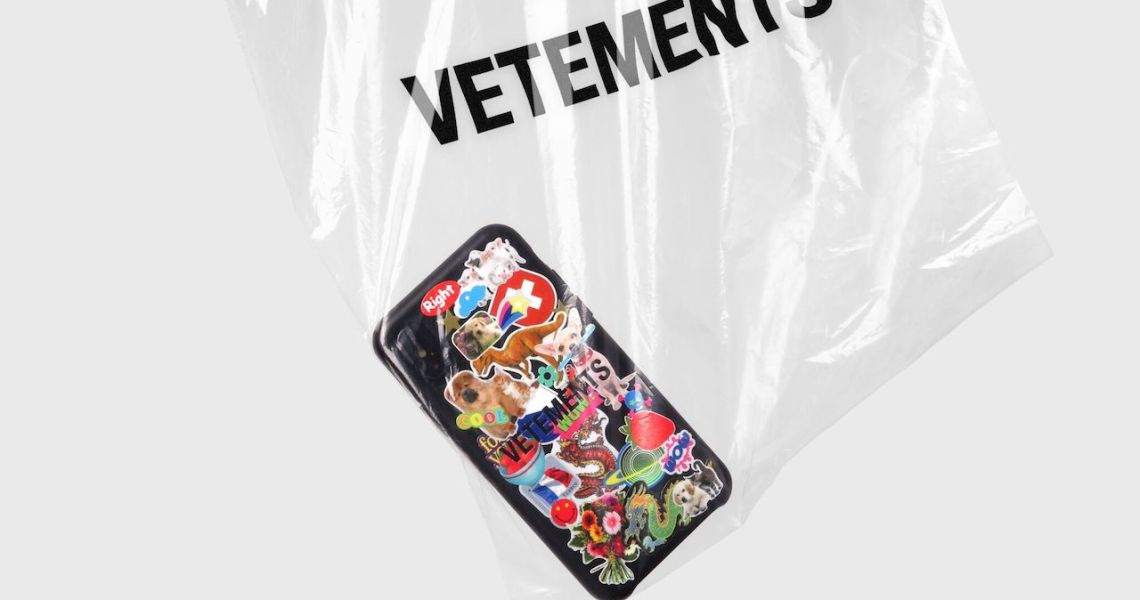Vetements is primarily known for its daring runway shows and avant-garde apparel offerings, but in the past few days, the brand has dedicated at least four Instagram posts to promoting a different product: a phone case.
The Vetements phone case was created with tech accessory brand Casetify, which has also collaborated with luxury brands including Moncler and Saint Laurent for relatively affordable accessories with a luxury brand name attached. The case is being sold through Casetify and retail partners like Ssense.
This is part of a growing trend in the luxury business of leaning into the accessibility of accessories. While luxury brands rely on the exclusivity of their more expensive apparel offerings, that exclusivity is always in conflict with the need to maximize revenue by getting as much product into people’s hands as possible. Accessories offer a good way to do that: Customers who are not affluent enough to be regular Gucci customers and drop more than $1,000 on a jacket can instead save up and get a Gucci belt or a pair of socks. At the same time, the brands are able to sell more product and create relationships with customers who may make further purchases in the future without having to lower any of the prices for their more expensive items — something that luxury brands are loath to do normally.
“Accessories are a quicker purchase, and the price point is somewhere a lot of customers feel much more comfortable spending,” said Marly Kos, business development and partnerships manager at Casetify. “It’s also something you can use every day. A Gucci sweater you don’t want to wear every single day, but phone cases you can use every day. The Vetements phone case is around $250, which is expensive for a phone case, but if you want to own something from Vetements, a T-shirt is like $600.”
Accessories are also often produced by expert third parties (such as Luxottica producing eyewear for a number of luxury brands, including Versace and Valentino, and Casetify handling production of phone cases), which can manufacture them more affordably. These products are then sold at the same markup as in-house produced items, justified by the brand’s name on it, making accessories incredibly profitable for brands.
In fact, accessories are so profitable for luxury brands that some have even theorized that most big luxury fashion houses are better characterized as accessories brands that use runway fashion merely for advertising. For example, from 2012 to 2017, Gucci made nearly 60 percent of its total revenue, far more than any other sector, from leather goods and shoes.
“Accessories currently hold 20 percent of the total luxury market assortment,” said Katharine Carter, retail analyst at Edited. “They are the top stocked category at the majority of luxury labels, making up over 45 percent of the product offering at designers including Fendi, Michael Kors, Gucci, Balenciaga and Prada. Accessories also boast lower discounting rates than apparel, which help luxury retailers gain a better margin.”
Ad position: web_incontent_pos1
But even for customers who can afford to buy more expensive items, accessories are still incredibly important. They can be a gateway into a new brand for someone who has never shopped it before, and they can help the most veteran of fashion consumers fill out every aspect of their lives, from phone cases to socks, with things that are fashionable.
“We always tell our brands that the phone case and tech accessory sector is very underestimated,” Kos said. “A lot of luxury brands understand the importance of accessories, but there are areas where they do not have a ton of experience. Fashion is an industry where people look at every aspect of their personal style and want all of it to be expressive.”
Eyewear is another area luxury brands are seeking out. Kering’s eyewear division just dropped Balenciaga’s first eyewear collection this week, and Deloitte ranked eyewear group Luxottica among the highest-performing luxury companies last year. Kering’s strength in the accessories market is one reason it is expected to weather the coming slowdown in the Chinese market better than others in the luxury world.
Capri Holdings, formerly known as Michael Kors Holdings, is even hoping to build an entire functioning luxury conglomerate based around accessories. Its recently acquired brands, Versace and Jimmy Choo, have all focused heavily on accessories in their recent shows and promotions. “Accessories are an area where we will need to have manufacturing capabilities in Italy to grow in size and scale,” CEO John Idol told WWD last year.
“Accessories offer a more accessible and often less expensive route for customers to buy into a brand, while still creating a brand connection,” Carter said. “With a number of designs holding cult status, such as Gucci’s Marmont bag and Chloé’s Nile bag, and garnering attention in street style and on Instagram, accessories also hold strong marketing value.”




